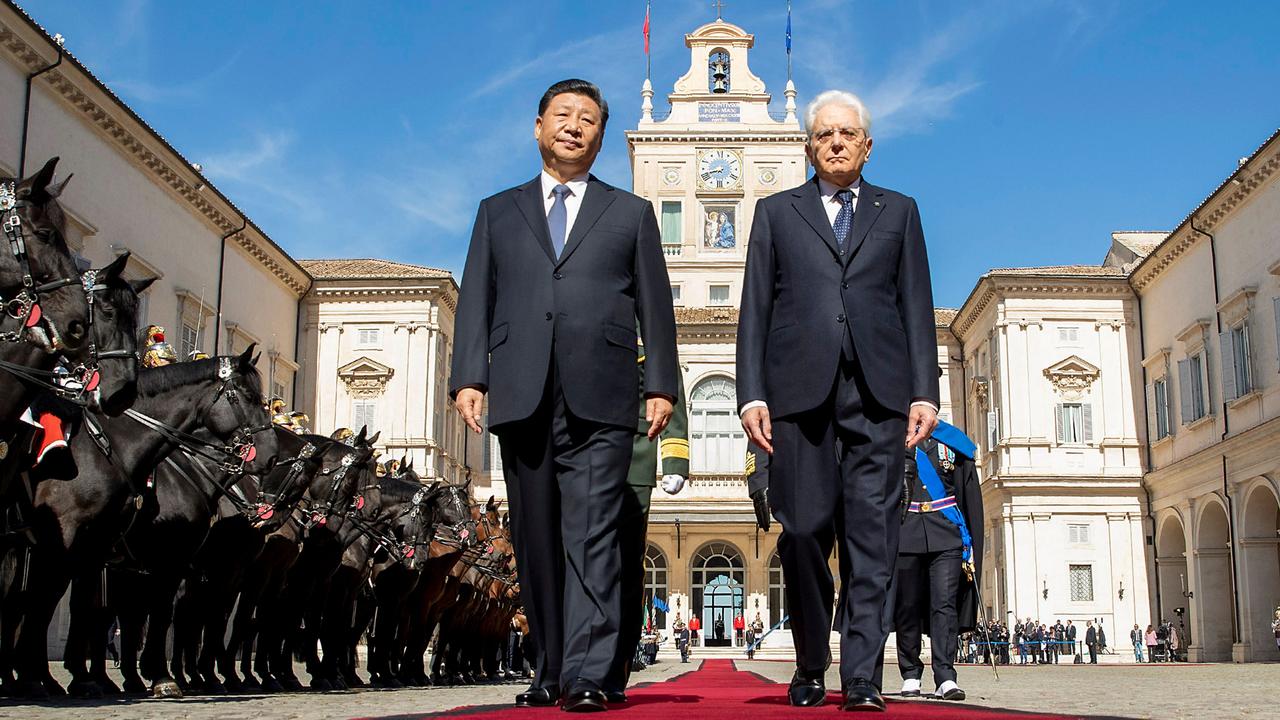Xi Jinping’s summer of discontent
The US-China trade war is driving an unexpected debate in China about President Xi Jinping.
The US-China trade war is developing into an almost existential tussle between the two countries’ larger-than-life leaders and is driving an unexpected debate in China about President Xi Jinping.
In Washington, policy is being developed and announced during this Donald Trump era in a very public, and hyper, manner by tweets and TV interviews. In Beijing there is simply a black box.
Astonishingly given China’s size and importance, less is known about who forms policy and how in the country today than at almost any time since ancient dynastic eras. This makes it difficult to analyse how Beijing is organising its response to Trump’s challenges.
There is growing evidence, though, that criticisms are building of Xi, including that his great project of “China’s rejuvenation” is too ambitious, and risks overreach parallel with that of the US in its responses to the 9/11 attack, an overreach perceived as leading to the global financial crisis.
But no clear alternatives have emerged to Xi — whose anti-corruption drive has removed all rivals and rival factions — and it seems more likely that he will persist in power long after Trump.
Xi’s rapid centralisation and personalisation of power, his ambitious pursuit of global authority, his break with Deng Xiaoping’s “old era” of reform-and-opening and announcement of his “new era”, caught everyone by surprise — even many of the 89 million in the Communist Party.
But challenges were inevitably going to emerge, and almost six years on from his arrival as general secretary, a range of problems are requiring sage responses.
Some of the challenges have been self-generated, including abolishing term limits and thus shifting away from the meritocratic leadership structure established by Deng, his severity in seeking to eradicate pluralism by bringing China’s borderlands including Hong Kong and Xinjiang to heel, his championing “cyber sovereignty” by using the internet as a tool of surveillance and control, and his 2015 announcement that China would double its economy in the decade to 2020, requiring continued stimulus and credit.
Other challenges have come from unpredictable events — led by Trump of course.
These include a scandal involving infant vaccines, the North Korea confrontation, and now the emerging trade war with America in which to China’s disappointment, Europe and east Asian neighbours have appeared reluctant so far to take its side. Australia and New Zealand have chosen at this juncture to stress the importance of basing their international relations on “rules based order”.
This is both a comfort and a challenge for Xi, who uses similar invocations himself. But he has in mind a new order. One of those ambitious goals he has set is to change fundamentally the nature of global governance. Only a few months ago, this seemed within his grasp. Now, there are more uncertainties.
Yu Yongding, a leading economists, said on the weekend that “some disturbing factors” had emerged in the country’s financial markets, forecasting a new round of capital outflows and currency depreciation. Fixed asset investment has slumped to a its lowest since 1999. The rate of retail growth has slowed. And unemployment rose last month to 5.1 per cent, from 4.8 per cent in June.
Few in China have a clue how policies to address such challenges are being developed. A tiny group of Xi associates, their identities largely unknown, must be presumed to be taking key roles in the “leading small groups” or commissions responsible for guiding the country’s key sectors.
In past eras, those playing decisive roles were often in routine contact with sources of broader advice, including party schools and universities. But those on Xi’s team instead appear to keep themselves to themselves.
Xi has built massive popularity in China, which he appears largely to retain. But David Cohen, a managing editor at Beijing advisory China Policy, says a view is emerging now that “there’s more room to push back”.
A Bloomberg analysis says “signs of upheaval are reverberating around Beijing during what is fast becoming Xi’s summer of discontent”, with articles from intellectuals questioning his policy direction, an embarrassing rebuke of his top economic adviser Liu He by Trump, and a rare public spat over policy between the central bank and Finance Ministry.
Wang Yiwei, international affairs professor at Renmin University and deputy director of its Xi Jinping Thought Centre, insists: “we should keep a low profile” and suggests rethinking how Xi’s signature Belt & Road Initiative is implemented.
An essay titled “Our Dread Now, and Our Hopes”, by Xu Zhangrun — a doctor of law from Melbourne University, now a law professor at Tsinghua University — that critiques the Xi era is reverberating around the Chinese speaking world.
Xu says the party-state has returned to the Mao-era slogan of “putting politics in command” instead of continuing the Deng-era focus on developing the economy: “In recent years, the gunpowder-like stench of militant ideology has become stronger … This state of affairs is also increasingly hindering exchanges between China and the outside world.”
Bill Overholt, an American expert on Asian political economies, believes Xi’s problems derive from his vulnerability — that as a creature of the party, he lacks the power to override it to achieve needed reforms, and is thus “more Theresa May than Mao Zedong”.
But the evidence for Xi being a thwarted zealous reformer appears slim. Party expert Jude Banchette says “Xi’s boldness has catalysed opposition internationally, not necessarily domestically”, and that there is no sign that Xi faces organised or open opposition internally. This seems right. But the challenges posed by Trump for Xi — after the latter at first looked to have got Trump’s measure — reveal that a true contest is now under way between the two great disrupters of our age.




To join the conversation, please log in. Don't have an account? Register
Join the conversation, you are commenting as Logout